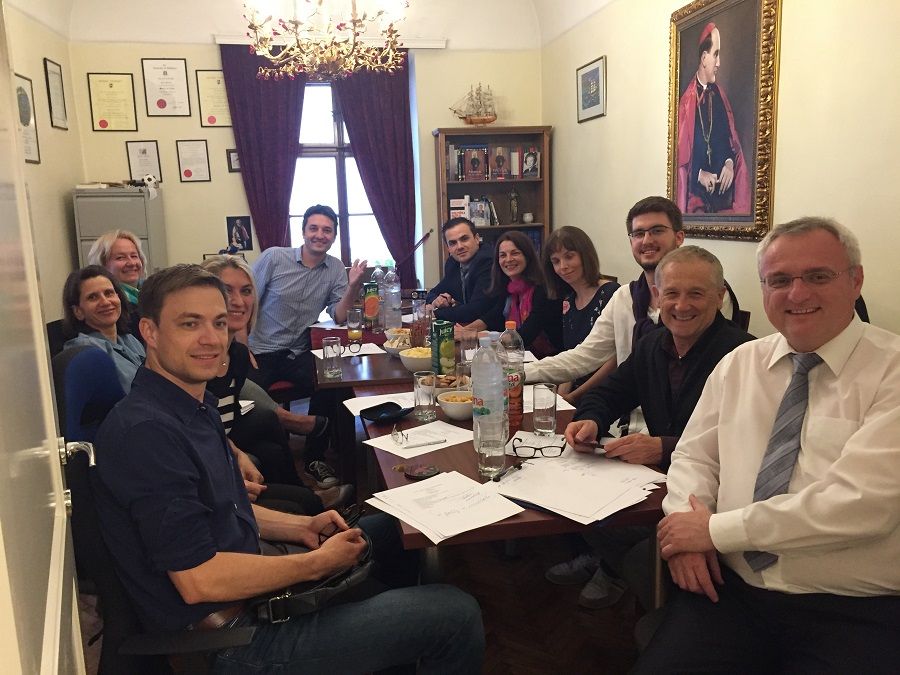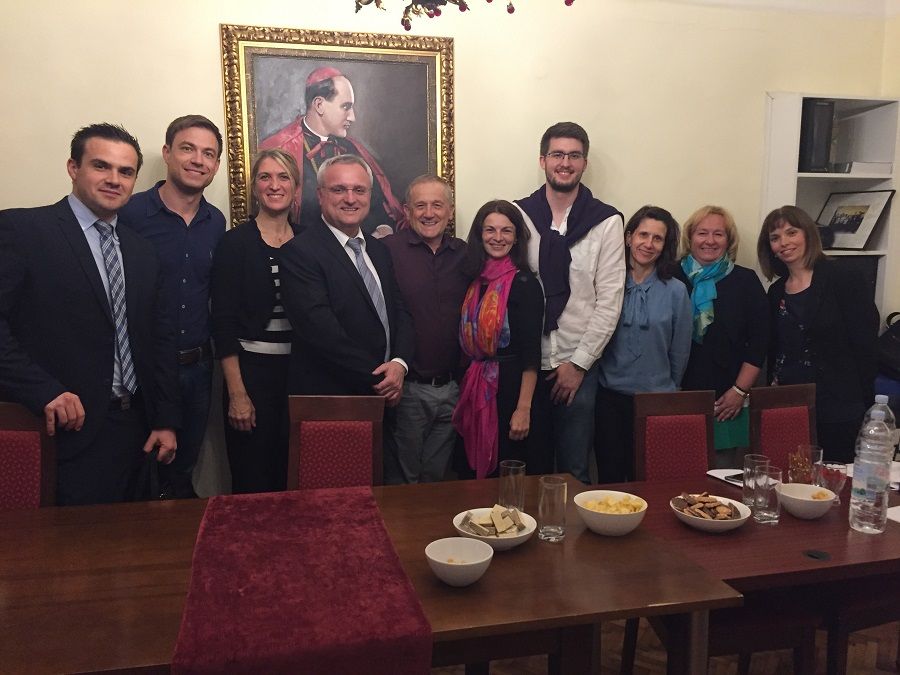Ahead of the 3rd Croatian Diaspora Conference in Osijek which starts on June 28, 2018, TCN catches up with Don Markušić, President of ACAP (Association of Croatian American Professionals) Zagreb Chapter.
1. For those who are not familiar with the life story of Don Markusic, can you tell us more about yourself and your story of the return to your homeland?
I was born in Zagreb and migrated to Australia with my parents when I was only a year old. Although I had no memory of my birthplace growing up in Australia, it was a strict Croatian upbringing and speaking Croatian at home was the law with serious sanctions for any uttered word in English. This was difficult for children of immigrants whose first language soon became English. However, I am now very grateful to my parents for their persistence because I would not have returned to live and work in Croatia without a good knowledge of the language, albeit, archaic Zagrebački kajkavski!
It was also not easy telling my school classmates that I was Croatian and being taunted that my country does not exist but with the Croatian community’s persistence, Australians gradually accepted us as a nation in our own right which culminated in their recognition of Croatia as a nation state.
I completed a law degree at Monash University in Melbourne and worked as a lawyer, all the while preparing for my return to my Homeland. I knew that after the Homeland War we would need to rebuild our country, so I completed a Master of Laws in International Law at Melbourne University with my thesis being the recognition of Croatia before it was recognized. Whilst the Anglo-Saxon professors were teaching me international law, I was applying my knowledge and showing them that the Homeland war was not a civil war as they perceived it and making the case for the recognition of Croatia.
I first joined an international law firm in Vienna whose practice involved foreign investment in Central and Eastern Europe and also became admitted to England and Wales so that I would not just be an Australian lawyer in Europe. Once I got a critical mass of foreign investors, I convinced the Austrian law firm to open an office in Croatia which I headed. I then developed the legal practice of PricewaterhouseCoopers and ultimately fulfilled my dream of establishing my own law firm in Zagreb to cater for foreign investors.
Being the only common law lawyer in Croatia, I am able to offer the best of both worlds to foreign investors and I have a great team of Croatian lawyers who are passionate about the law and serving clients.
2. You are a member/founder of ACAP (Association of Croatian American Professionals). What is the idea behind this organization? In which way do you empower Croatian-American professionals and Croatians around the world?
Empowering Croatian-American professional and Croatians around the world is actually our motto. ACAP members represent all facets of the international professional community, such as scientists, doctors, engineers, attorneys, artists, journalists, business executives, accountants, etc. We also welcome individuals of non-Croatian heritage who are active in the Croatian community.
Our mission is to foster knowledge-sharing and networking among Croatian-American professionals and Croatian professionals around the world for mutual success; Promote the advancement of Croatian-American professionals and Croatian professionals around the world; Encourage Croatian-American business and trade; Foster camaraderie amongst our members; and work with other Croatian-American organizations and Croatian organizations around the world on matters of common concern and Croatians around the world
3. By being a part of this organization you must have a vision of further cooperation between Croatia and its diaspora. Vision 2030?
Our vision is Croats at home and abroad working together to make Croatia succeed. This is why ACAP is establishing a branch office in Croatia so that it will be present on the ground in order to have direct impact. Croats in our Homeland and from all around the world can become members of the ACAP Zagreb Chapter by being members of the US organisation.
Our ACAP Zagreb Chapter will enable the exchange of information between Croats at home and abroad and who will work together in order to have direct economic and political impact through law reform, developing sectors such as medical tourism and improving the investment climate with initiatives such as the US-Croatia Double Tax Treaty. These things can only be done through a combined effort of Croats at home recognising the particular needs and Croats abroad knowing how to fill them and with both working together to make it happen.
4. 1.2 mil Croats live across the USA, 200.000 in Australia and round 350.000 in Europe. What should we change to attract more investments or maybe even encourage their return? Your own experience would be more than appreciated.
I could list here all the usual suspects for improving the investment climate such as predictability and certainty, particularly in relation to legislative changes regarding taxes etc.; a more efficient judicial system; less red tape; combatting corruption etc. I could also list incentives for investment including fiscal and other measures but all of these also apply to domestic as well as all foreign investors and not just the diaspora.
In addition to the obvious measures for attracting more investment and encouraging the return of Croats from abroad, we need to include the diaspora in the social, economic and political life of our country. In relation to my own experience, I had a difficult path in becoming a lawyer in Croatia because I was the first common law lawyer from the Anglo-Saxon legal system, so they were not quite sure what to do with me. As a result of my struggle, there are now clear guidelines so that I have made it easier for other lawyers who want to practice in Croatia. We should make it easier for Croats abroad to obtain Croatian citizenship and to have their qualifications recognised so that they can get on with contributing their knowledge and experience to their Homeland.
5. Do you believe that full potential of Croatian people living abroad is being used at its best, particularly speaking of its scientific, business, sport, cultural and other potentials?
What is the level of knowledge of Croatian Americans about the current situation in Croatia?
There is no question that Croatian people living abroad are underutilised in every segment that you mention even though they are ready and willing to contribute far more in terms of sharing knowledge and experiences. The problem is that Croatian governmental institutions are not aware of what the diaspora would like to do for our country and the diaspora does not have enough information as to what it can do.
The level of knowledge, not just of Croatian Americans but our diaspora in general, about the situation in Croatia is poor even in this age of information and social media etc. Being the linchpin and providing two-way information between the diaspora and our Homeland will be an important role for the ACAP Zagreb Chapter. Investment projects and opportunities need to be properly presented and the diaspora must be made aware of how it can contribute to making changes such as to pending legislation etc.
6. You are a part of the organization committee of the Croatian Diaspora Congress from its beginning. Why is it important to continuously gather members from the diaspora and how important are they for the prosperity of Croatia? Can they be the factor which will stop this “negative” trend and start the reversed one?
Being part of the organisation committee of the Croatian Diaspora Congress from the outset is part of the reason why I returned to Croatia to contribute to the development of our Homeland by assisting investors in Croatia. The importance of the diaspora to the prosperity of Croatia can be seen in the fact that the diaspora is the biggest investor in Croatia with more than EUR 2 billion being remitted annually. The Croatian economy would flourish if this sort of financial commitment was also transposed to real investments.
Not since the Homeland War has there been such fervour and need for cooperation between Croats at home and those abroad to work together to make Croatia succeed which is the only way to stem the exodus and even reverse the trend.
7. One of the key messages of this upcoming Congress is “Export knowledge, not people”.
What prerequisites we need to keep young educated people in Croatia?
This is a very important message because Croatia invests a lot of money on educating and training people which other countries then benefit from, for free! I export my legal services both in relation to advising foreign clients as well as advising other governments in relation to law reform and drafting new laws.
An uncertain future due to corruption and cronyism as well as politicians and activists constantly denigrating their own country, are largely to blame for the mass exodus of qualified Croats and young families. The long disconnect between the Croatian Diaspora and their Homeland was caused by early diaspora investments having gone awry for the exact same reasons.
Young educated people want to have a future in which they know that their hard work will pay off both professionally and financially. They want a career path that is merit based and which they feel does not exist in Croatia.
Young educated people do not like their achievements and accomplishments being disregarded or even belittled. In his sermon at the recent Statehood Day Mass, Cardinal Bozanić even referred to the mocking of our country as a reason for young people leaving. When somebody does something bad in Australia then it is called “UnAustralian”. In England they say that “It’s just not cricket”. In Croatia they say, “Welcome to Croatia” when something goes wrong. I have even heard a politician talk about investment in Croatia as “ABC - Anything but Croatia”. The War Veterans who are cornerstone of our country do not get anywhere near the respect afforded to War Veterans in other countries. I am very proud that the Glina War Veterans Association made me an Honorary Member.
“Poduzenik” or entrepreneur has become a dirty word and the term “Self-made man” does not even translate into Croatian. Most of our successful diaspora are business people and it is this entrepreneurial spirit that is needed and which they can impart on young people in Croatia. Young Croatian people are winning international competitions all the time in the area of innovation and they just need the opportunity to capitalise on their ideas.
8. In your opinion, did the past two Congresses have any concrete results, considering that everything takes time, even the good things? What was the thinking behind this Congress and what are your expectations from this year´s edition?
I would firstly like to congratulate Marin Sopta for this excellent initiative when he organized the first Diaspora Congress in Zagreb in 2014 and kept the momentum going. I would also like to thank him for involving me from the outset. You are right in saying that good things take time and the first two Congresses have set the scene for success at this year’s Congress when there is a greater connection between the diaspora and Croatia at home so that the time is ripe to work together to make Croatia succeed. Connections have also been occurring between diaspora members at the first two Congresses who would otherwise have never met and have benefited from the exchange of knowledge and experiences from their respective countries.
However, to paraphrase Mark Zuckerburg’s testimony before the US Congress earlier this year, it’s not enough to just connect Croats in the Diaspora with Croats in our Homeland, we have to make sure those connections have positive outcomes. We are now at that stage with this third Congress and I am very much looking forward to the event and its outcomes.




